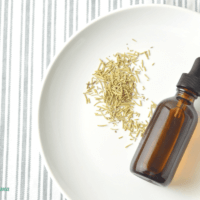As a mom of 6, I’ve had my fair share of postpartum hair loss! And I’m not alone. By age 50 nearly 25% of women and 50% of men experience hair loss. Here’s how to fix it and how rosemary oil for hair can help!
Rosemary Oil For Hair
I’ve talked before about different hair regrowth options, but rosemary continues to be one of the most popular. Pure rosemary oil (rosmarinus officinalis) is great for hair health and it’s recently been trending on sites like TikTok. While I’m not one to do a TikTok video dance, I have no problem divulging how to use rosemary oil for hair growth.
Rosemary is a key ingredient in the hair growth spray I used after my pregnancies. And there’s plenty of research behind this unassuming herb. But first, let’s look at what’s causing the problem.
What Causes Hair Loss?
It’s important to understand what’s really going on in the scalp with hair loss. The average person loses about 50-100 hairs a day. While that may seem like a lot, we’re also constantly growing new hairs to replace old hairs.
According to Mayo Clinic, here are some common causes of hair loss in men and women:
- Stress and emotional or physical trauma
- Traction alopecia – this happens when hair is pulled back and styled too tightly. Think cornrows and tight ponytails.
- Certain medications, like cancer drugs and antibiotics
- Hormonal changes
- High levels of DHT hormone (a common cause for men)
- Pregnancy (again, hormonal changes)
- Genetics (the most common cause in men)
- Nutritional deficiencies
- Chronic health conditions, like diabetes and lupus
- Alopecia areata (an autoimmune condition that causes patchy hair loss)
I always recommend getting to the root cause of the issue. Eating whole foods, taking targeted supplements, and supporting whole body health go a long way toward healthy, natural hair.
Benefits of Rosemary For Hair
We’ve identified the problem, now what to do about it? Healthy hair starts with a healthy scalp. Rosemary can help by blocking the effects of DHT, a testosterone that shrinks hair follicles, leading to hair loss. It’s also a vasodilator and increases blood circulation to the scalp and stimulates hair growth. More blood flow means healthier hair follicles and healthier hair. This helps maintain hair and prevent excess shedding and breakage.
Essential oils like tea tree and peppermint can also help with hair growth but in a different way. Rosemary specifically targets the hair follicles. A 2022 review looked at scalp treatments for hair loss and thinning hair. The researchers found strong evidence that saw palmetto, rosemary oil, pumpkin seed oil, and CBD oil can help with male hair loss.
Another study from 2015 compared rosemary oil with the hair loss drug minoxidil (Rogaine) for androgenetic alopecia. In men, this condition is called male pattern baldness, but it’s common in women too. The groups both had an itchy scalp, but the rosemary group was less itchy. Overall hair growth was the same, but the rosemary hair oil group had fewer side effects.
Other studies have looked at rosemary in combination with other essential oils. Tea tree and rosemary oil treatment helped strengthen damaged hair and activate hair follicles.
Rosemary for Scalp Health
Since it increases circulation and is anti-fungal, rosemary can also help with dandruff buildup. It has anti-inflammatory properties that soothe the scalp. It’s also antibacterial and antioxidant. Those with a dry scalp may notice more hydration.
How Long Does it Take to Work?
In the 2015 study above, there wasn’t any noticeable difference in either group at the 3 month mark. However, there was a big difference at 6 months. It may not take the full 6 months, but expect to use rosemary for a while before seeing results.
Rather Buy it?
The recipe below is simple and easy. But, if you’re too busy to make your own or don’t have the ingredients here are some premade options. The active ingredient is rosemary, but they also have other scalp-nourishing ingredients.
- Castor Oil Rosemary Oil – Handcraft Blends
- Shine No 18 – Vegan Mia Organiics
- Herbal Hair Oil – Badger
- Rosemary Hydrosol – Plant Therapy
- Hair Therapy Strengthen & Grow Hair Serum – Plant Therapy
Rosemary Hair Care
Most of the research has centered around rosemary essential oil. Some studies used rosemary extract though. Another option is to make your own hair growth oil by infusing rosemary leaves into a carrier oil, like avocado or coconut oil. Here are instructions for how to do a solar infusion.
You can then mix your rosemary infused oil with other hair and scalp nourishing oils. When we coat the hair shaft with oil, this better allows our sebum to soften, smooth, and strengthen hair. Some good hair strengthening oil options include:
- Castor oil (sparingly, this oil is thick and sticky)
- Jojoba oil
- Argan oil
- Olive oil
You can use these same carrier oils to dilute rosemary essential oil. I almost always dilute my essential oils, especially when it comes to skincare. They’re very potent and a little goes a long way! Most aromatherapy sources recommend about a 2% dilution for face and general body care. If you have very sensitive skin, you may need to dilute even further.
In practical terms, this would be 5 drops of rosemary oil for every 1 Tablespoon of carrier oil. If you’re using a rosemary herb-infused oil, then it can be applied undiluted. For the DIY recipe below, use 20 drops for a 1% dilution and 40 drops for a 2% dilution.
How to Add it to Your Hair Care Routine
Certain oils, like coconut, can clog hair follicles if they’re left on for long periods of time. They can also make hair look greasy and weighed down. Those with thinner hair types have more issues with this. Since rosemary oil is applied to the scalp, you may want to apply it before shampooing your hair. Just be sure to leave the hair treatment on for at least 20 minutes.
You could also apply the oil before bed and sleep with a towel on the pillow. Then wash it off with your morning shower.

4.31 from 39 votes
Rosemary Oil Hair Serum
This easy DIY rosemary oil for hair helps strengthen hair and nourishes the scalp.
Prep Time3minutes mins
Yield: 4 ounces
Author: Katie Wells
Equipment
Materials
- 7 TBSP grapeseed oil (or other carrier oil of choice)
- 1 tsp castor oil
- 1 tsp jojoba oil
- 20-40 drops rosemary essential oil (OR Hair Therapy Oil Blend)
Instructions
- Combine all of the ingredients in the glass dropper bottle.
- Shake well to combine.
- Store in a cool, dark place away from direct light and heat.
Notes
How to Apply: Part the hair and apply a few drops to the scalp. Continue moving across the scalp, parting hair and adding oil. Use your fingertips to massage it in. Leave in for at least 20 minutes before washing off.
Can be used several times a week or daily.
Who Can Use Rosemary Oil?
Rosemary herbal infusion is generally safe for most people. You can always do a patch test on your arm to test for any irritation. And if the oil is a little too strong, it may just need diluted more.
Rosemary essential oil safety is a little murkier. Aromatherapists don’t recommend applying it near the face of young children. The 1,8 cineole content can cause breathing problems. However, most children aren’t going to need a hair growth product.
Experts Tisserand and Young don’t note any particular safety issues during pregnancy and breastfeeding. However certain rosemary chemotypes have high levels of camphor that are toxic when ingested. These include rosemary verbenone and rosemary camphor. Topical use is different than ingesting it, but some sources recommend avoiding rosemary essential oil completely during pregnancy to be on the safe side.
I couldn’t find any solid evidence that using diluted rosemary essential oil as a wash-off scalp treatment is harmful for breastfeeding moms. Some sources use the cautionary approach and recommend against using any essential oil during breastfeeding.
Bottom line: if you’re pregnant or nursing, ask an aromatherapist or natural health care provider before using rosemary on the scalp.

